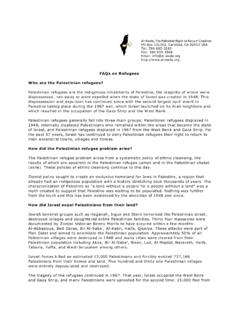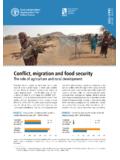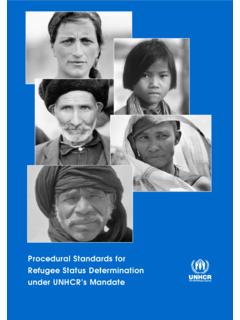Transcription of refugee council of australiareport
1 refugee council of australiareportOctober 2015 Asher HirschPolicy OfficerDELAYS IN CITIZENSHIP APPLICATIONS FOR PERMANENT refugee VISA HOLDERS2refugee council of australiaContentsExecutive summary 3 Background 4 Significance of citizenship for refugee and humanitarian entrants 4 Background to citizenship in Australia 5 Research into citizenship delays 6 Methodology 6 Findings 6 Impact of citizenship delays and concerns regarding the application process 7 Denial of family reunion 7 Inability to visit family 8 Lack of information and reason for delays 8 Delays and cancelations of citizenship ceremonies 8 Further identity checks and security checks 9 Requests for difficult to obtain documents 9 Citizenship test 9 Babies born in Australia to stateless parents 10 Appendix A: Steps in the Citizenship Process 11 Photo photo: slgckgc via Flickr3 Executive summary The Contracting States shall as far as possible facilitate the assimilation and naturalization of refugees .
2 They shall in particular make every effort to expedite naturalization proceedings and to reduce as far as possible the charges and costs of such proceedings. Article 34, 1951 refugee ConventionCitizenship has particular significance for refugee and humani-tarian entrants. refugees are, by definition, unable to return to their country of origin because of a well-founded fear of perse-cution or other forms of serious harm. Australian citizenship is therefore often the first effective and durable form of protection that many refugees receive, and is celebrated and cherished by them. For those who know what it is like to live without freedom and democracy, obtaining citizenship in a free and democratic country is particularly citizenship is also especially important for people who wish to sponsor family members to Australia.
3 While refugees on permanent visas can sponsor family members to Australia, Min-isterial Directive 62 places the family members of boat arrivals at the lowest processing priority. Gaining citizenship is one way people hope to be able to sponsor their family, many of whom are at risk of persecution and death. Citizenship also allows for-mer refugees to travel safely to their countries of origin to visit family members who they have not seen for many will be explained further below, there are in effect two steps to becoming a citizen. One is having your citizenship application approved but you do not become a citizen until the citizenship pledge is taken and this normally happens at a citizenship the past few months it has come to the attention of the Ref-ugee council of Australia (RCOA) that refugees on permanent visas are experiencing significant delays in the process of apply-ing for Australian citizenship.
4 In response to this issue, RCOA held a face to face consultation and an online survey involving 188 people from refugee backgrounds who have experienced substantial delays in their citizenship applications. While the Department of Immigration and Border Protection (DIBP) claims to reach a decision on 80% of citizenship appli-cations within 80 days (not including additional time to attend a ceremony). Yet those that RCOA consulted or surveyed have been waiting on average 215 days since lodging their application. For those who have completed the citizenship test and are yet to attend a ceremony and receive their citizenship, the average wait is 357 days from the time of their application. In addition, three other people consulted failed the citizenship test indicating fur-ther barriers the test places on humanitarian evidence collected by RCOA suggests that these delays are disproportionately affecting those who arrived in Australia by boat, as over 89% of those people who have been consulted arrived in this manner.
5 RCOA notes that these delays appear to have commenced after September 2013. The evidence collected suggests the delays are occurring either when recognised permanent residents are applying to complete the citizenship test (ie they are taking longer to be given a time to take their test), or when those who have completed every other requirement are waiting to attend a citizenship ceremony. Other applicants are being asked for documents which are almost im-possible to obtain, due to the nature of their refugee experience. The fact that permanent refugee visa holders, who have passed rigorous security assessments and identity checks, are being asked for supplementary information is also of great number of applicants have received letters of approval from the Minister of Immigration and Border Protection, stating that the final step to gain citizenship is to attend a citizenship ceremony.
6 However, these people have not been invited to participate in a citizenship ceremony, despite regular, often monthly, citizenship ceremonies occurring in each municipality. We have also heard from applicants who received a call or text message the night before they were due to attend the ceremony indicating that the ceremony was cancelled. However, months later, they still have not been invited to attend another spoke of their frustration regarding the lack of com-munication and information from DIBP, with many receiving little or no information about their application and the reason for the , and as a separate issue, RCOA has also heard of circum-stances where the Minister of Immigration and Border Protection has failed in his obligation to grant stateless children born in Australia citizenship, as required to under 21(8) of the Austra-lian Citizenship Act 2007.
7 While the Act requires the Minister to confer citizenship, the current Minister and his predecessor have failed to respond to the applications and this also breaches the Minister s responsibilities regarding making a decision under the council of australiaRCOA believes these delays are unreasonable, discriminatory and unfair, and calls on the Minister for Immigration to resolve this issue for the hundreds of people affected by these delays. Recommendation 1 Clarify if there has been a policy change in regard to citizenship applications for refugees with a permanent visa, specifically in relation to those who arrived by 2 Take steps to process the citizenship applications of refugees immediately, or otherwise clarify the specific reasons for the delay to each individual applicant.
8 Recommendation 3 Fulfil his obligations under section 21(8) of the Australia Citizenship Act 2007 and grant citizenship to stateless children born in Australia within a reasonable 4 Make every effort to expedite citizenship application and to reduce as far as possible the charges and costs for applications by refugees and humanitarian arrivals, as required under Article 34 of the refugee Convention. BackgroundSignificance of citizenship for refugee and humanitarian entrantsThe right to a nationality is an essential human right. Article 15 of the 1948 Universal Declaration of Human Rights declares that everyone has the right to a nationality. Nationality creates rights and duties for both the State and the individual. These rights or duties are not available to a person without citizenship, resulting in a lack of opportunity, protection and participation.
9 Citizenship is also essential in realising a number of other human rights, such as the right to take part in political affairs. While human rights 1 See RCOA s literature review on the economic, civic and social contributions of refugees and humanitarian entrants, available at globally, citizenship is the main way through which people can access these has particular significance for refugee and humani-tarian entrants. refugees are, by definition, unable to return to their country of origin because of a well-founded fear of perse-cution or other forms of serious harm. Citizenship is therefore often the first effective and durable form of protection that many refugees receive, and is celebrated and cherished by them. For those who know what it is like to live without freedom and de-mocracy, obtaining citizenship in a free and democratic country can be particularly meaningful.
10 As one former refugee noted in RCOA s community consultations: Having a citizenship is highly valued. It gives you equal rights and equal protection for the first time. refugees are honoured to have an Australian citizenship and we appreciate the rights, protection and obligations that comes with it. If we didn t have an Australian citizenship we would have nowhere to go. The acquisition of citizenship plays a central role in resolving the situation of refugee and humanitarian entrants. This is recognised by the 1951 refugee Convention, which requires its signatories to as far as possible facilitate the assimilation and naturalisation of refugees and make every effort to expedite naturalisation proceedings and to reduce as far as possible the charges and costs of such proceedings.







